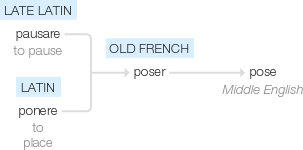Pose
Middle English: from Old French poser (verb), from late Latin pausare ‘to pause’, which replaced Latin ponere ‘to place’. The noun dates from the early 19th century.
wiktionary
From Middle English pose, from Old English ġeposupl(“cold in the head; catarrh”, literally “(the) sneezes; (the) snorts”), from Old English pos, ġepos(“sneeze, snort”), from Proto-Germanic *pusą(“sneeze, snort”), from Proto-Germanic *pusōną, *pusjaną(“to snort, blow”), from Proto-Indo-European *bew-(“to blow, swell”). Compare Low German pusten(“to blow, puff”), German dialectal pfausen(“to sneeze, snort”), Norwegian dialectal pysa(“to blow”).
From Middle English posen, from Old French poser(“to put, place, stell, settle, lodge”), from Vulgar Latin pausāre(“to blin, cease, pause”), from Latin pausa(“pause”), from Ancient Greek παῦσις(paûsis); influenced by Latin pōnere. Doublet of pause.
From Middle English posen, a combination of aphetic forms of Middle English aposen and opposen. More at appose, oppose.
etymonline
pose (v.1)
late 14c., posen, "suggest (something is so), suppose, assume; grant, concede," from Old French poser "put, place, propose," a term in debating, from Late Latin pausare "to halt, rest, cease, pause" (source also of Italian posare, Spanish posar; see pause (v.)). The Late Latin verb also had a transitive sense, "cause to pause or rest," and hence the Old French verb (in common with cognates in Spanish, Italian, Portuguese) acquired the sense of Latin ponere "to put, place" (past participle positus; see position (n.)), by confusion of the similar stems.
One of the most remarkable facts in F[rench] etymology is the extraordinary substitution whereby the Low Lat. pausare came to mean 'to make to rest, to set,' and so usurped the place of the Lat. ponere, to place, set, with which it has no etymological connection. And this it did so effectually as to restrict the F. pondre, the true equivalent of Lat. ponere, to the sense of 'laying eggs;' whilst in all compounds it completely thrust it aside, so that compausare (i.e. F. composer) took the place of Lat. componere, and so on throughout. Hence the extraordinary result, that whilst the E. verbs compose, depose, impose, propose, &c. exactly represent in sense the Lat. componere, deponere, imponere, proponere, &c., we cannot derive the E. verbs from the Lat. ones since they have (as was said) no real etymological connection. [W.W. Skeat, "Etymological Dictionary of the English Language," 1898]
The meaning "put in a certain position" in English is from early 15c. The intransitive sense of "assume a certain attitude or character" (with implications of artificiality) is from 1840; the transitive sense in reference to an artist's model, etc. is from 1850. Related: Posed; posing.
pose (v.2)
"to puzzle, confuse, perplex," 1590s, earlier "to put questions to, interrogate closely" (1520s), probably from French poser "suppose, assume," from Old French poser "to put, place, set" (see pose (v.1)). Also in some cases a shortening of English appose "examine closely," and directly from oppose (of which appose was a variant). Related: Posed; posing.
pose (n.)
"act of posing the body; attitude, position, whether taken naturally or assumed for effect," 1818, from pose (v.1), in a sense developed in the French cognate. Figuratively, "attitude of mind or conduct," from 1884. Earlier in English it meant "something deposited, a pledge" (mid-15c., from Old French pose, past participle of poser), hence "a secret hoard or treasure."
